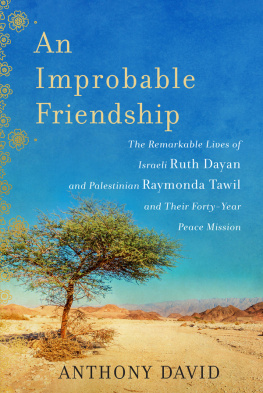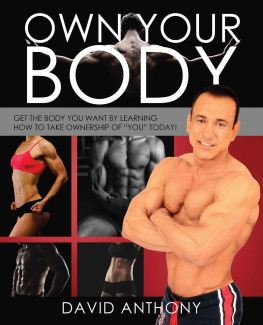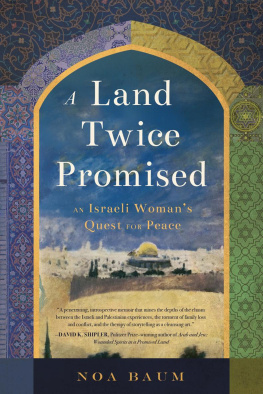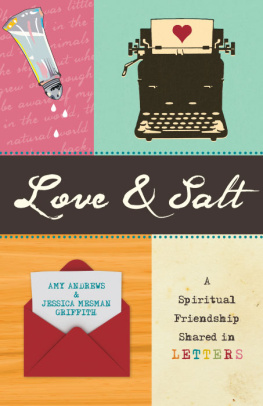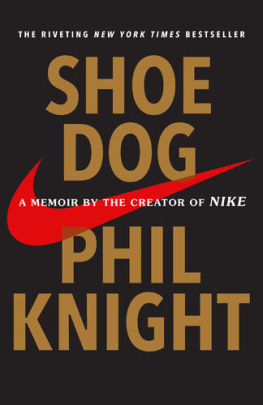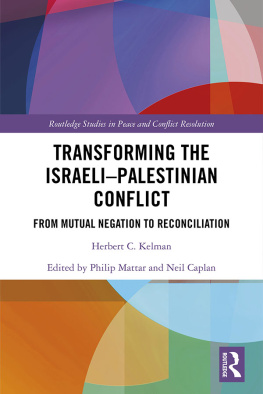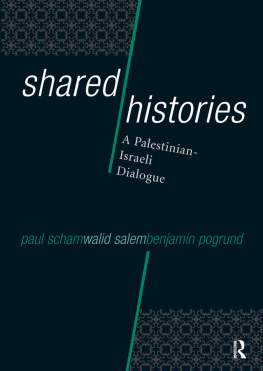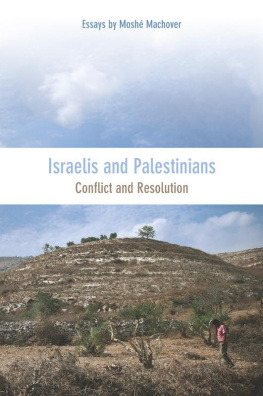Also by Anthony David
Once Upon a Country: A Palestine Life (with Sari Nusseibeh)
Lamentations of Youth: The Diaries of Gershom Scholem 19131923
Edited and translated by Anthony David
A Life in Letters: Gershom Scholem
Edited and translated by Anthony David
The Patron: A Life of Salman Schocken, 18771959
Copyright 2015 by Anthony David
All rights reserved. No part of this book may be reproduced in any manner without the express written consent of the publisher, except in the case of brief excerpts in critical reviews or articles. All inquiries should be addressed to Arcade Publishing, 307 West 36th Street, 11th Floor, New York, NY 10018.
First Edition
Arcade Publishing books may be purchased in bulk at special discounts for sales promotion, corporate gifts, fund-raising, or educational purposes. Special editions can also be created to specifications. For details, contact the Special Sales Department, Arcade Publishing, 307 West 36th Street, 11th Floor, New York, NY 10018 or .
Arcade Publishing is a registered trademark of Skyhorse Publishing, Inc., a Delaware corporation.
Visit our website at www.arcadepub.com.
10 9 8 7 6 5 4 3 2 1
Library of Congress Cataloging-in-Publication Data
David, Anthony, 1962- author.
An improbable friendship : the remarkable lives of Israeli Ruth Dayan and Palestinian Raymonda Tawil and their forty-year peace mission / Anthony David. First English-language edition.
pages cm
ISBN 978-1-62872-568-1 (hardback); ISBN 978-1-62872-631-2 (E-book)
1. Dayan, RuthFriends and associates. 2. Tawil, Raymonda HawaFriends and associates. 3. Arab-Israeli conflictInfluence. 4. Women and peaceIsrael. 5. Women, Palestinian ArabMaltaBiography. 6. IsraelBiography. 7. MaltaBiography. I. Title.
CT1919.P38D394 2015
327.172095694dc23
2015027734
Cover design by Laura Klynstra
Cover photo: Alexey Stiop / Shutterstock
Printed in the United States of America
To the memory of Jackie Kahn, whose friendship and encouragement inspired Ruth Dayan to tell her story.
Only those who are capable of listening to the unforgetting silence of this tormented soil, from which everyone begins and to which everyone returns, Jews and Arabs, has the right to call it homeland.
Meron Benvenisti
Contents
Acknowledgments
F or her passion and belief in this book, my profound gratitude to my agent and friend Dorothy Harman. Without you, Dorothy, this book would never have been written. Esther Margolis, our partner, has also worked tirelessly and with astonishing energy to make this book a reality. My thanks to my publisher and editor at Arcade, Jeanette Seaver, who has more than lived up to her reputation as one of the great figures in publishing today. With her legendary sense of language and story, Jeanette fashioned a manuscript into a book. The rest of the team at Arcade, through the proofreading and design process, has done an extraordinary job in making this book complete. Finally, I want to thank Clare, my love, who accompanied me on this journey.
Prologue
A Secret Story
S ometimes it can seem that the only thing Israelis and Palestinians share is a common skepticism that there can ever be a solution to the conflict. As an American writer living and working in Jerusalem, this pervasive pessimism is what compelled me to write about Ruth Dayan and Raymonda Tawil. These two women, from the most prominent families of their respective nations, turned a chance encounter after the Six Day War into an improbable lifelong friendship that shows how, with empathy and common sense, the seemingly insolvable Middle-Eastern conflict can have an end.
Ruth and Raymonda did more than defy national taboos. At great risk and, on occasion, attracting dangerous attention to themselves, both women worked together for decades to address the underlying sources of the conflict. The more time I spent with these extraordinary women, the more I realized their story had to be told.
How dare Ruth! Raymonda said at the start of our Skype video conversation. She had just woken me up at 3 a.m. I was in my apartment in Jerusalem; she was at her home in Malta, where she lives with her daughter, Suha Arafat, Yasser Arafats widow. After four years, I knew Raymonda well enough to distinguish between her emotions of anger, frustration, and hurt. She was clearly angry. I could see it in the way she kept slipping off her glasses and putting them back on again.
I dont want to have a book now, she continued. How can I put my name next to Ruths? Do you know what she said to me?
Raymonda, calm down. Tell me what happened. Despite the early hour, the idea that my book on Raymonda and her best friend, Ruth Dayan, would suffer yet another setback made me break out in a sweat. Id already abandoned a ghostwritten version of the story in favor of a straight dual-biography. Would I have to start over again from scratch?
Anthony, I know how much time youve put in this book. But I just cant go on. Make it into a novel if you want. Turn it into an Agatha Christie murder mystery because I think Im going to kill her....
What happened? I poured myself a cup of coffee.
What happened? As usual, Ruth defended Moshe. Can you believe it, after all these years?
From my experience, the two womens forty years of friendship and their basic agreement on the nature of the Israeli-Palestinian conflict, and on almost everything else, never prevented the occasional flare-up. Which was only to be expected because Raymonda Tawil was Yasser Arafats mother-in-law, and Ruth is the widow of Moshe Dayan, the most celebrated Jewish general since Joshua and a man who spent much of his military career doing everything in his power to hunt down Arafat.
Raymonda, I said to her, sipping my coffee. Ruth was married to Moshe for decades, she had three children with him, she loved himand still does. Okay, you think he was a psycho. But...
She cut me off and insisted, with sniffles, that I call Ruth and tell her finito ! Im pulling the plug on the book.
Ruth was awaiting my call. The woman nearly at the century mark has more energy than most college students. She, too, had the voice of someone who had just stopped crying.
Hi, Ruth.
Hi.
I just got off the phone with Raymonda, and she tells me youve been quarreling.
Quarreling? She screamed at me. Her voice was quivering.
She says you yelled at her first.
And what do you expect me to do when she sends me such an email? This was the first mention of an email. And its all your fault. When I inquired why I was to blame, she explained that my interviews with Raymonda had dislodged memories, reopening old wounds. She wrote terrible things. Just awful. I will NEVER speak with her again.
Ruth, Ive heard you say that a dozen times, and you two always reconcile. You love one another.
This time I mean it. Just read the email.
What does it say?
Ruth got up and went to her office to read the email from the computer. Raymondas message began with My dear Ruthy, you are a great woman, you are compassionate, full of humanity, a woman I can call my best friend because you are your own army of love. While your husband was hunting down our best men, you were racing around Palestine looking for women to help. You are a feminist hero.
Cmon Ruth, its not such a bad letter.
Why does she have to say that about Moshe?
My God, do you expect Raymonda to like Moshe? Ruth, who downplays her own latent case of PTSD, doesnt fully appreciate how scarred the woman she calls her soul mate is after a life of exile and loss.

